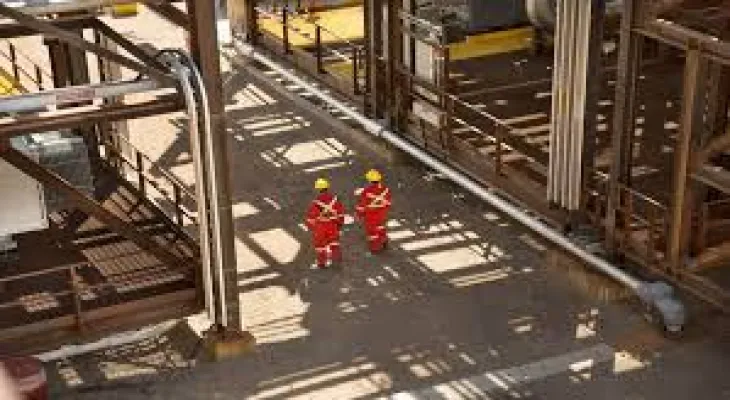Search here
Newspaper
Search here

Arab Canada News
News

Published: May 8, 2024
Shell has sold millions of carbon credits for reductions in greenhouse gas emissions that never occurred, allowing the company to profit from its nascent carbon capture and storage project, according to a new report from Greenpeace Canada.
Under an agreement with the Alberta government, Shell was granted the equivalent of two tons of emission reduction credits for every ton of carbon it had actually captured and stored underground at its Quest facility near Edmonton.
This occurred between 2015 and 2021 through a support program for carbon capture and storage (CCUS) projects, which is endorsed by the oil and gas sector as a means of reducing greenhouse gas emissions.
At that time, Quest was the only operational facility for carbon capture and storage in Alberta. The support program ended in 2022.
During this period, Shell was able to sell 5.7 million tons of what Greenpeace describes as "phantom" credits, netting the company over $200 million. Greenpeace claimed that these credits were sold to other companies operating in the oil sands in Alberta’s carbon market.
Such sales were not illegal, but represented a "hidden subsidy" within the program that undermined the effectiveness of industrial carbon pricing, says Keith Stewart, senior energy strategist at Greenpeace and author of the report.
"The carbon capture projects that were touted as a solution for pollution in the oil sands have been almost entirely funded by the public," he said.
Sock received $777 million from the federal government and provincial governments and $406 million from carbon compensation revenues, according to company records cited by Greenpeace.
Greenpeace stated that taxpayer funding generally covered 93 percent of the costs of Shell's Quest project to date.
Since 2015, Quest has stored nine million tons of carbon dioxide. (In comparison, total emissions from the oil and gas sector surpassed 158 million tons in 2022, the latest available federal data).
Swipe function
Carbon credits are bought and sold under a trading system, where governments set a price on carbon dioxide emissions to compel companies to combat climate change.
Since 2007, Alberta has operated a mandatory carbon offset system for large emitters, such as oil and gas companies. If they exceed their designated levels of carbon dioxide emissions, they must purchase credits to offset those emissions.
Ryan Fournier, spokesperson for Alberta Environment Minister Rebecca Schultz, said the report is "a smear job from Greenpeace."
Fournier acknowledged in an email that the Alberta government previously provided "significant credits to help accelerate the development of carbon capture and storage technology."
But he described the program as "a targeted incentive to help drive investments in carbon capture and storage at a time when this technology was still unproven."
The Quest facility is operated by Shell Canada and is owned by Canadian Natural Resources, Chevron, and Shell Canada.
In response to the report, Shell Canada spokesperson Stephen Dolan stated that carbon capture technology is critical to achieving international climate goals.
He added that "thanks to innovative financial and regulatory frameworks, nine million tons of carbon dioxide have been captured at the Shell Quest facility that would have otherwise been released into the atmosphere."
Neither the province nor Shell denied the sale of additional credits.
Heavily reliant on subsidies
Pierre-Olivier Pineau, a professor and energy policy researcher at HEC Montreal, said the Greenpeace report highlights a "key underlying problem" regarding carbon capture and storage, which is that "the economic environment is not yet there to make their business viable."
He continued, "It has to rely on subsidies, which becomes problematic because the government ultimately ends up subsidizing polluters," adding that this also shows the need to raise the carbon price.
"Carbon capture and utilization can only be properly incentivized by imposing a [higher] penalty on carbon emissions."
Pineau stated that without a sufficiently high price, carbon capture and storage projects will be scrapped because they "are not as profitable as just releasing carbon dioxide directly into the atmosphere"—unless they are significantly subsidized, as is the case with Shell.
Last week, Capital Power Corp, based in Edmonton, announced it had abandoned plans to build a $2.4 billion carbon capture and storage project at the natural gas-fired Genesee power plant southwest of Edmonton.
Up to three million tons of carbon dioxide could have been captured annually at the facility.
The Pathways Alliance, a consortium comprising the largest oil sands companies in Canada, is still trying to move forward with a $16.5 billion carbon capture pipeline project, but is seeking to cover about two-thirds of that amount through subsidies.
Monitoring loopholes
Federal data released last week found that Alberta is lagging behind other provinces in reducing emissions, with the oil and gas sector still being the largest contributor to greenhouse gas emissions.
A spokesperson for Natural Resources Minister Jonathan Wilkinson said, "The oil and gas sector needs to move forward in achieving absolute emissions reductions."
Caroline Svonkin stated, "It’s time for the sector to spend money and put solutions in place that will reduce carbon pollution and ultimately enhance the sector’s long-term competitiveness."
Referring to the Greenpeace report, Svonkin noted that the federal government updated its national carbon pricing benchmark in 2021 "to ensure that all pricing systems across provinces and territories are comparable in terms of rigor and effectiveness."
The statement said, "This puts an end to operations that could have rewarded the industry for unverifiable emission reductions."
The federal government is expected to announce details on the emissions cap in the oil and gas sector in the coming months. Stewart stated that he wants to ensure that there are no "similar loopholes built into it in ways that undermine the policy's effectiveness."
Comments